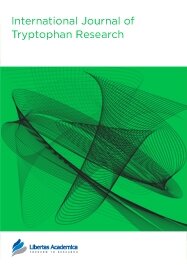

Publication Date: 11 May 2010
Type: Original Research
Journal: International Journal of Tryptophan Research
doi: 10.4137/IJTR.S3682

The endogenous neuroinhibitory amino acid receptor antagonist kynurenic acid (KYNA) has been hypothetically linked to physiological processes and to the pathogenesis of several brain disorders. The aim of this study was to search KYNA metabolism i.e. KYNA levels and enzymes synthesising KYNA kynurenine aminotransferase I and II (KAT I and II) in the central nervous system (CNS) and in the peripheral nervous system. Within the investigated species we found a remarkably low KYNA content (3.4 nM) in piglet’s serum compared to rat and human serum. Furthermore, in contrast to high KAT activity present in rat and human livers, a lack of KAT I and KAT II activity was found in piglet liver and other piglet peripheral organs. Therefore we attempted to find a reason for the absence of KYNA formation in piglet peripheral tissue and we researched to find if KYNA formation in rat liver homogenate (measured under standard assay conditions for KAT activity) can be influenced by the application of piglet tissue homogenates and other body fluids. KYNA formation in rat liver homogenate was investigated in the presence of piglet liver, piglet brain, rat brain and human brain homogenates, and also in the presence of cerebrospinal fluid (CSF) of the control and of Multiple Sclerosis patients. We found a significant and dose dependent reduction of rat liver KAT I and KAT II activities in the presence of piglet brain, piglet liver, and human brain, but not in the presence of rat brain homogenate. Interestingly, CSF of the human control subjects significantly lowered rat liver KAT I activity. Furthermore, the inhibitory effect of CSF of Multiple Sclerosis (MS) patients was significantly weaker when compared to the CSF of control subjects. Our data, for the first time, indicated the presence of active component(s)—depressing factor—in the body, which was able to block KYNA formation. Reduced KAT inhibitory effect by CSF of MS patients would suggest a lowered “depressing factor” level in CSF of MS patients and is possibly responsible for an enhancement of KYNA formation and for glia activation and gliosis in the CNS. Subsequently, two fractions obtained after centrifugation of CSF from patients with Neuroborreliosis showed a significantly different ability to block KAT I activity. The CSF-sediment fraction exerts a stronger inhibitory activity than the CSF-supernatant fraction, supporting further the presence of a depressing factor. For the first time, data revealed and demonstrated the ability of endogenous components to block KYNA’s synthesis. We propose that a glia depressing factor (GDF), which is abundantly present in the body, might simultaneously control glia cell’s KAT activity, respectively KYNA synthesis and also glia proliferation. The mechanism(s) of action, the composition and structure of this factor needs to be further elaborated.
PDF (609.10 KB PDF FORMAT)
RIS citation (ENDNOTE, REFERENCE MANAGER, PROCITE, REFWORKS)
BibTex citation (BIBDESK, LATEX)
XML
PMC HTML

I was delighted with the speed and efficiency with which my paper was processed. The friendly and personal communications with editorial staff also made the experience extremely pleasant and easy. I should be happy to recommend International Journal of Tryptophan Research to anyone.

All authors are surveyed after their articles are published. Authors are asked to rate their experience in a variety of areas, and their responses help us to monitor our performance. Presented here are their responses in some key areas. No 'poor' or 'very poor' responses were received; these are represented in the 'other' category.See Our Results
Copyright © 2013 Libertas Academica Ltd (except open access articles and accompanying metadata and supplementary files.)
FacebookGoogle+Twitter
PinterestTumblrYouTube